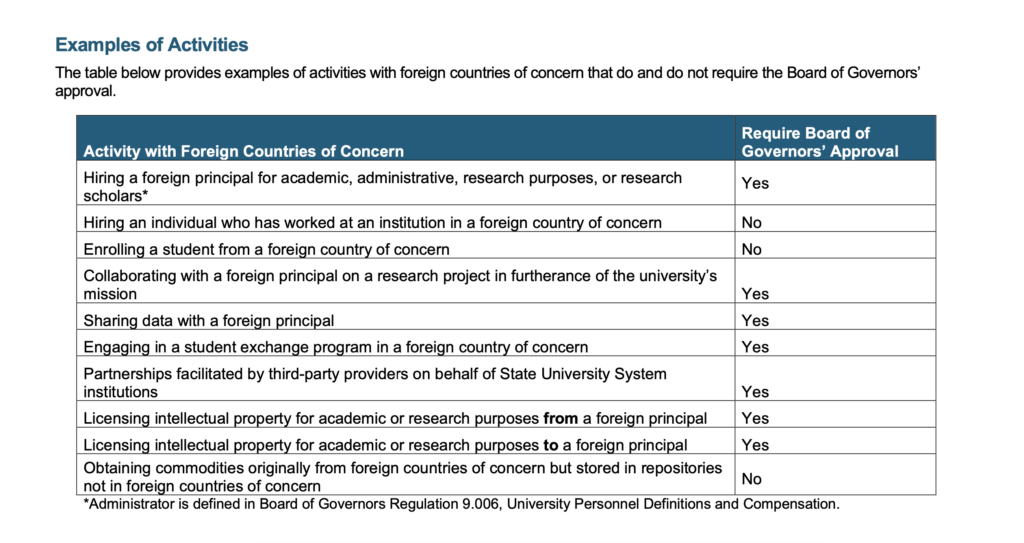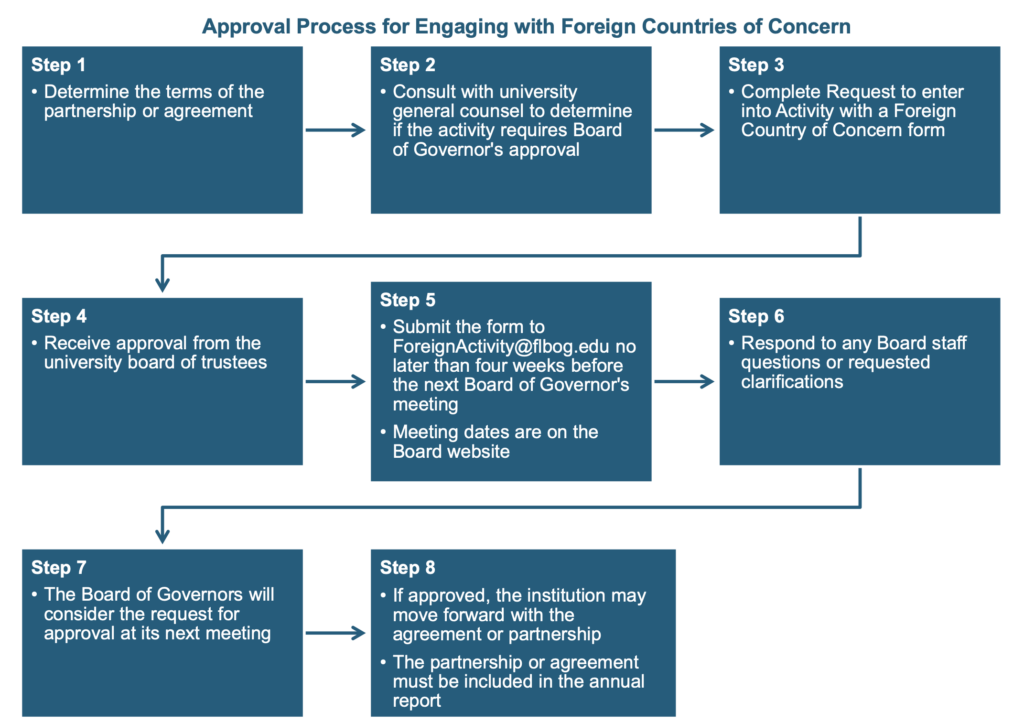
On December 12, Science website disclosed that public universities in Florida will now be barred from admitting graduate students and postdocs from seven countries, including China, Russia, Cuba, Iran, North Korea, Syria, and Venezuela, into their academic laboratories.
Banned primarily from conducting related research, the statute notes that students can still be hired if they pass a rigorous review. However, the process details are unclear, and the 12 Florida public colleges and universities covered by the law are still working out the specifics of implementing it.

This decision will be made on a case-by-case basis and represents the final step in a thorough review for anyone seeking a graduate assistantship or postdoctoral research position. Students from the countries in question can still be admitted to graduate programs but cannot be paid for their research projects.
The law defines a “foreign principal for academic, administrative, research purposes, or research scholars” to include not only those currently residing in another country but also anyone who has been trained or employed outside the U.S. for one year or more, even if they hold U.S. citizenship. Additionally, individuals turned away due to questionable backgrounds must be reported to the FBI or another law enforcement agency designated by the governor.
More than 280 faculty members at the University of Florida, which has the largest research portfolio in the state, signed a petition urging the University to clarify the current confusion and expressing support for an open hiring policy. The petition, sent on December 6 to University of Florida President Ben Sasse and senior University of Florida leaders, emphasizes that failure to act quickly could result in the loss of talented students to other universities, and this loss would be irreversible.

The bill introduces significant uncertainty regarding admissions, directly impacting graduate student admissions to these institutions for the fall of 2024. Typically, admissions at colleges and universities take place between December and early January each year.
The origins of this legislation trace back to SB 846 that was initially introduced in the Florida Senate in February 2023, approved by the entire Florida House and Senate in early May, and subsequently signed into law by Florida Governor Ron DeSantis.
It is noteworthy that in recent years, Governor DeSantis has been recognized for his stance on Chinese exclusion in U.S. politics. In the first half of this year, in addition to SB 846, he signed and passed SB 264, a bill prohibiting Chinese individuals from purchasing houses and land in Florida. Following the signing of these bills, Governor DeSantis emphasized to the media that these measures are intended to curb the growing influence of the Chinese government.

Regarding SB 846, while some defenders argue that it is not a ban on Chinese students entering Florida’s academic laboratories but an additional approval process, the practical implementation of the bill is more complex. SB 846 proposes a default ban that can only be lifted through the application for a license. In this sense, SB 846 implies a broad restriction on academic exchanges between the Florida public university system and China.
Moreover, the scope of SB 846’s default prohibition is extremely broad. It regulates Florida’s entire public higher education system, which represents the upper limit of what Florida’s legislative system can regulate.
The subjects of foreign countries of concern are also very general, including not only the universities of those countries but also individuals, i.e., citizens of those countries. This implies that collaborative exchanges between Florida’s public universities and any Chinese university or research institute are prohibited at the institutional level, as well as collaborative exchanges between Florida’s public schools and any Chinese citizen. For instance, if a lab at a Florida university recruits a postdoc who is a Chinese national, it would require a waiver from the Board of Governors. This is why the Science news story characterizes the bill as a ban on Chinese students in Florida labs.

The Florida Board of Governors is a 17-member organization responsible for governing and guiding the entire Florida public university system. Fourteen members are appointed by the Florida governor, with additional representation from the Florida Superintendent of Schools, the president of the Florida Teacher Advisory Council, and the president of the Florida Student Association.
Despite each public university in Florida having its own independent Board of Regents for managing school operations, SB 846 mandates that academic activities involving China, including hiring a postdoctoral fellow, require approval from the top administrators of the entire public school system. This level of micromanagement is deemed absurd.
Beyond micromanagement, the most significant and troubling impact of SB 846 is its challenge to the long-standing principle of academic openness. The bill not only requires licenses for the transfer of intellectual property to China but also for the importation of intellectual property from China. SB 846 is seen not as a measure to protect intellectual property rights but as a blatant interference with transnational academic exchanges.

Moreover, SB 846 is criticized for its discriminatory nature. Amid strained relations between China and the U.S., scientific research exchanges have been marred by incidents of discrimination.
The U.S. Department of Justice’s “China Initiative” during the Trump administration, ostensibly aimed at preventing intellectual property theft, turned into an effort to interfere with and stigmatize researchers engaging in academic exchanges with China. More than 90% of defendants implicated in the China Initiative are of Chinese ethnic background, raising concerns about racial profiling and discrimination.
Reflecting on the discriminatory history in the U.S., from the black slavery system to the Chinese Exclusion Act and Japanese internment camps, it is noted that every instance of racial discrimination and ethnic oppression did not make the United States safer. Instead, reconsidering and addressing ethnic discrimination has historically corresponded with the development and progress of the United States.
(Source: flbog)



